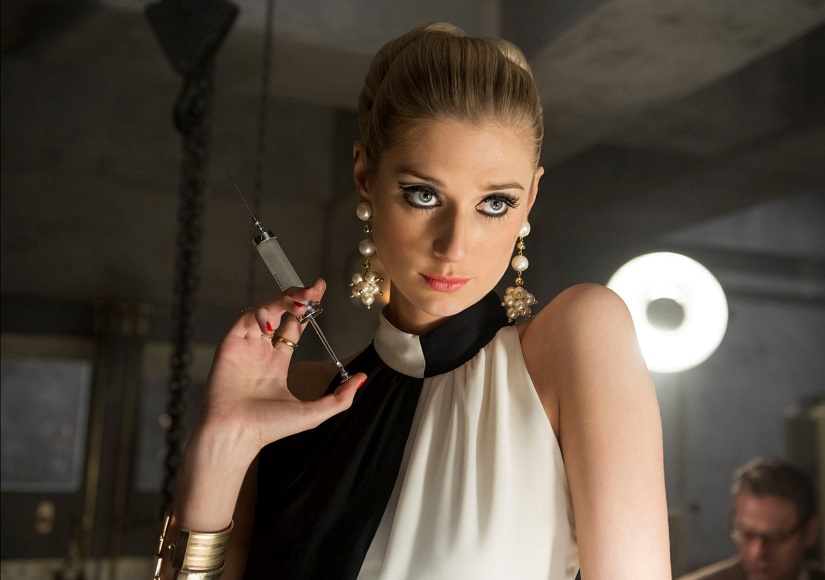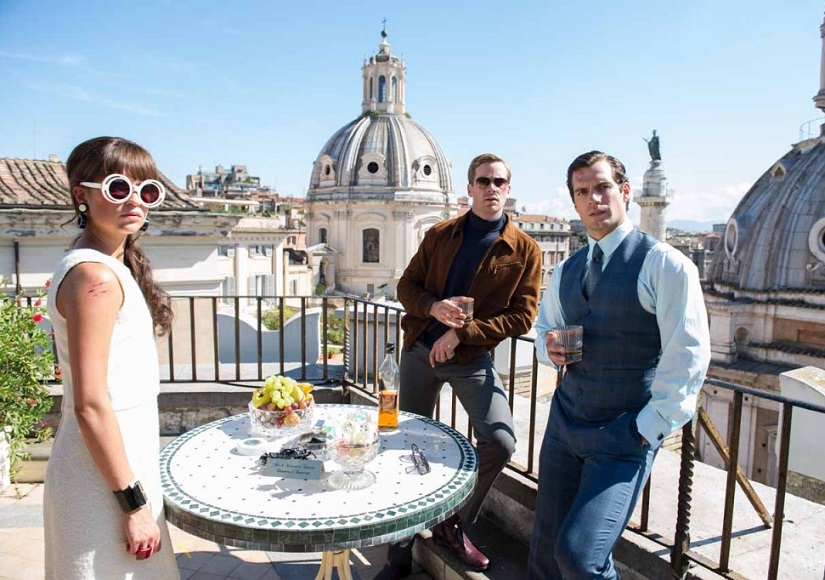I’m not sure how many people remember the original Man From UNCLE, which isn’t much of a surprise since it was a fairly light and silly series to begin with, but I adored it growing up. The cast was terrific and it delivered a consistent stream of fluffily enjoyable spy shenanigans, finding a comfortable middle ground between the loopiness of latter era Avengers and the outright comedy of Get Smart. It made stars out of Robert Vaughan, who played debonair cool to the hilt as Napoleon Solo, a character unsurprisingly named by Bond creator Ian Fleming, and David McCallum, who brought mystery and aloof cool to his more intellectual Soviet partner, Illya Kuryakin. Light and silly is by no means a bad thing.
I doubt it’ll make any difference to 99% of the people watching, but Guy Ritchie’s big screen interpretation captures the tone of the series perfectly. His U.N.C.L.E. is a caper from beginning to end, light on its feet, funny all the way through and anchored by charismatic performances across the board, most notably from Henry Cavill. That it doesn’t quite fully satisfy is down to the movie also carrying over the series’ flippancy when it came to plot, which here only really serves to contextualise its set-pieces and sight gags. It stays on the right side of the line between being light and being in danger of floating away, but it’s a style over substance affair which works best as a short and sweet dessert to the summer’s meatier blockbusters than as a full meal in its own right.
[youtube id=”CzYRlISYE8Y”]
The Man From U.N.C.L.E.
Director: Guy Ritchie
Rating: PG-13
Release Date: August 14th, 2015
What little plot there is sees the CIA and KGB team up after a former Nazi scientist goes missing and is believed to be in the process of constructing a nuclear bomb for an unknown organisation overseen by Victoria Vinciguerra (Elizabeth Debicki). American agent Solo (Henry Cavill) and Soviet agent Kuryakin (Armie Hammer) are partnered and sent into the field with the scientist’s estranged daughter, Gaby (Alicia Vikander), to track him down. It’s essentially the plot of every post-Thunderball Cold War spy movie ever, and that Bond movie even gets a nod courtesy of both movies featuring a supporting character called Count Lippe. Writers Ritchie and Lionel Wigram have little to no interest in subverting the established form or the politics of the situation in any way, choosing instead, not unjustifiably, to focus on giving the core cast plenty of opportunities to bounce off each other and look fabulous doing it.
The undeniable star of the show is Cavill, who gets Robert Vaughan’s exaggerated smoothness spot-on without resorting to lazy imitation. His Solo is charm personified, never flustered or anything less than immaculately tailored and quip-ready in any given situation. The fact he’s built like Arnold Schwarzenegger is somewhat distracting – no-one in the ’60s, even bodybuilders, had his body shape – but easily overlooked when he’s such an enjoyable screen presence. Alicia Vikander is given less to do as Gaby, who suffers for being the pivot point of a narrative the movie barely seems interested in, but her sweetness and humour shine through and she’s quite adorable dancing in her pyjamas and rocking day-glo mod fashions. While villainess Victoria Vinciguerra is similarly undercooked on the page, Elizabeth Debicki amps up the aristocrat detachment to winning effect. If she’s difficult to take seriously as the movie’s big bad, it’s by no means down to Debicki’s performance, but rather the movie surrounding her with a glut of other potential villains who never amount to anything other than drawing attention away from where it deserves to be.
Last but not least is Armie Hammer’s Illya Kuryakin, whose constantly livid Soviet bluster makes a wonderful foil for Cavill’s über-cool Solo, even if the character is the polar opposite of the series’ cultured intellectual. As mentioned, I doubt enough people will remember the series for it to be an issue, but as a fan, it’s a little disappointing to see Kuryakin reduced to a somewhat one-dimensional brute, mostly for the purposes of providing Solo with someone to direct his droll one-liners at. This Kuryakin is more or less your stereotypical Ivan Drago Soviet, all punching power and little brainpower, where the original was more nuanced and shaded, inspired by the reserved but honourable manner of many great characters from Russian literature. Armie Hammer, himself of Russian descent, is nevertheless very funny and gives the character plenty of integrity, striking up an endearing game of one-upsmanship with Solo.
The movie’s internationalism manifests in both the casting – which features an Australian playing a Brit, two Brits playing American, an American playing a Russian, a Swede playing a German, and seemingly only a very droll Hugh Grant playing his own nationality, probably because he can’t do anything else- and Daniel Pemberton’s glorious score, which blends Western-influenced themes for Solo (nicknamed ‘Cowboy’) with more subtle Russian influences for Kuryakin, mixed into a grand cocktail of ’60s breeziness. Ritchie’s direction is similarly spry, though while his heavily stylised approach makes the most of the movie’s caper-ish qualities and its character interactions, his frivolity leaves the action sequences feeling weightless and inconsequential, particularly a late game assault on Vinciguerra’s island base (what else?) delivered through split-screen shorthand.
Still, there’s a great deal to like and while the movie permits itself to leave the option open for many sequels to come – whether they will actually happen remains to be seen, as movies this strongly stylised have rarely gone on to be viable starting points for franchises – it functions perfectly satisfactorily as a self-contained experience in its own right. It’s a welcome change from the myriad blockbusters seemingly more intent on selling you on movies yet to happen than offering anything worthwhile in the here and now. As is the case with all modern movies set in the ’60s, the period trappings are far too busy and trying far too hard to actually resemble anything released in the actual ’60s, but they do give the movie an identity and reality it can call its own.
Coming in at a shade under two hours, it slightly overstays its welcome and runs out of steam on its last leg – an off-road chase sequence feels lifted from a completely different, lesser movie – with an ending that is nothing if not abrupt and fails to give the required impact to the feature-long build up to the lead characters finally coming together under the eponymous mantle. However, should the box office come through, I’d be delighted to watch plenty more of these. It’s to Ritchie’s great credit that he eschews the usual lineup of tired buzzword qualities – dark, gritty, epic – in favour of one more altogther underrated: fun. Go in expecting nothing more consequential than a good time and a few laughs and UNCLE serves up an ideal end-of-summer palate cleanser.


